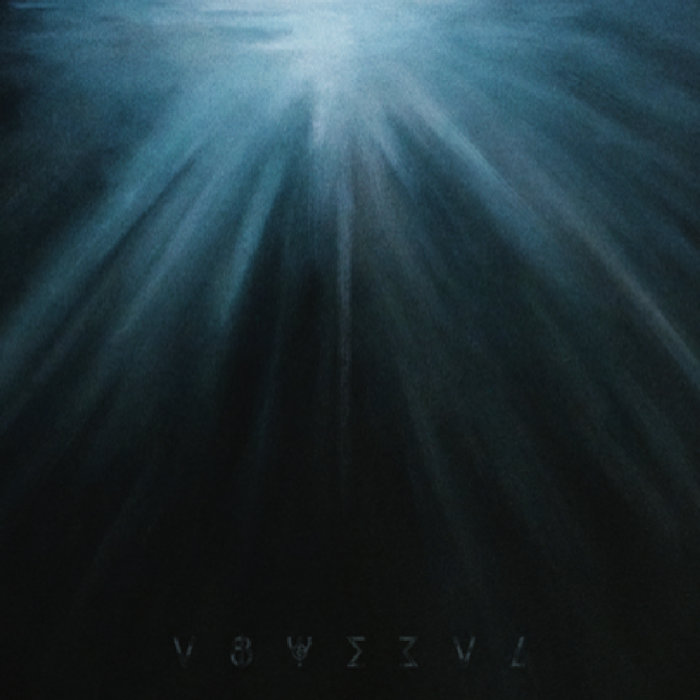If anyone among you hasn’t yet realized that this band from Tijuana has been making impressive music for a long time, it might be because of their name, which has been claimed by several other bands, their labels that barely receive international attention, or the Funeral Doom genre itself, a niche style that few associate with their homeland, Mexico. So Abyssal is relatively unknown in Europe, even though the group has been active since 2008, consistently delivering quality and producing several outstanding albums. Up until now, Abyssal has been considered a hidden gem, but they truly deserved at least a modest level of recognition before “A Deep Sea Funeral.” With this album, that recognition is more urgent than ever.
In essence, Abyssal stays true to their own style with “A Deep Sea Funeral”: One album = one song (here, approximately 40 minutes long) about underwater realms, no eruptive bursts of violence, plenty of depressive oppression, and shrill despair. So far, Abyssal has always been a band worthy of attention.
And now there is this record: mystical, with a Western-infused Dark Jazz that Heroin And Your Veins always aimed to embody, this project by Fernando Ruiz flows lazily and authentically into the ear. More than nine minutes of lingering steel guitar, Mellotron, and Rhodes swathes pass before any beat kicks in. The transition to the overdriven riff is abrupt but not unexpected. The hoarse growling and the incoming drums rush in simultaneously. Suddenly, something new and unique emerges, something remarkable that oscillates Funeral Doom between Neo-Noir, Surrealism, and Dark Jazz.
Surrealism and Neo-Noir meet Funeral Doom
The music dives into the oceanic depths of Funeral Doom, reflecting an acoustic exploration of the surreal within this symbolic experience— a world where the ordinary is mysteriously and eerily distorted. A reality where dream and reality blur together, the utopia of Breton:
“I believe in the future resolution of these seemingly opposite states of dream and reality in a kind of absolute reality, if one may say: Surreality. After its conquest, I strive, certainly, not to reach it, too carefree, however, about my death, not at least to weigh the joys of such possession.”
(André Breton: First Surrealist Manifesto (1924))
The dreamlike reality of the underwater world becomes a surreal darkness, both ominous and sublime. Especially in the long, meditative introductions, imbued with flickering Mellotron layers and the echoing sound of the steel guitar, there is a parallel to the worlds that Lynch and Badalamenti created, masterfully propelling the surreal between film and soundtrack as the core of cinema.
“A Deep Sea Funeral” is a Funeral Doom with a dynamic that drifts into the Neo-Noir Western atmosphere of Heroin and Your Veins and Lynch/Badalamenti. It evokes the feel of a Neo-Noir à la Lynch’s “Lost Highway”, the otherworldly atmosphere of postmodern cinema between Refn’s “Only God Forgives”, Aronofsky’s “Pi”, or Ana Lily Amirpour’s “A Girl Walks Home Alone at Night”, along with the Kafkaesque isolation of the individual in their own sense and being.
Lynch took old Hollywood with all its stereotypes and ideals and, beginning with “Blue Velvet”, arranged it under the premise that beneath the surface of the whitewashed fences of an American idyll, evil, danger, and cruelty are ever-present. But instead of pointing a finger and simply showing his audience the monster within the human, Lynch increasingly delved into the fractured psyche of his characters. The cinematic triptych of “Lost Highway”, “Mulholland Drive”, and “Inland Empire” depict more Freudian nightmarish / dreamlike worlds and Jungian archetypes than linear stories. On the big screen, Lynch painted more between symbolism and surrealism than just filming. Meanwhile, Badalamenti always managed to underscore Lynch’s visions with an oppressive beauty, bridging lounge jazz and noir film quotes. Movies became a surreal Gesamtkunstwerk, a veritable exhibition. Filmmakers like Refn, Amirpour, Noé, Aronofsky, and others have walked through the door Lynch and Badalamenti opened into a world between mainstream and arthouse. Film and music became a subjective visual and auditory nightmare of postmodern reality, gaining mainstream credibility. It is no coincidence that the Dark Jazz genre—those slow, darkly surreal ambient and lounge sounds played on jazz instruments, with Bohren & der Club of Gore as its foremost ambassadors—is rooted in the collaboration between Badalamenti and Lynch.
Dark Jazz meets Funeral Doom
As in a Lynch film, where the boundaries between reality and fantasy blur, “A Deep Sea Funeral” also merges the lines between darkness and light, between expectation and surprise. The slow, lingering waves of the first minutes pull the listener into a surreal, almost dreamlike world—a place where time is not linear and the sound appears as fluid as it is fractured. A world deep below the water’s surface, deep within the psyche. And just like Badalamenti’s melodies—always hiding a threat beneath the surface—Abyssal’s music is laden with latent tension, which releases in abrupt riffs and hoarse growls.
Abyssal may not have been the most innovative band before this album, but they were always skilled and, especially with “Misanthrope 2020” (another record close to perfection), atmospherically solid. However, the idea displayed in “A Deep Sea Funeral” of attaching a rare Funeral Doom dynamic to Dark Jazz—using instruments like Rhodes Piano, Mellotron, Vibraphone, Brush-played tom-toms, and Saxophone—is relatively new.
While similar ideas had already been explored by bands like Vofa or Poet (who, however, used more chamber orchestra-style concepts) and especially by the Finnish project Starboard, Abyssal has achieved a small artistic feat here: the first perfect execution of this young hybrid, even before Föhn graced us with similar ideas. Whether this crossover can further solidify itself and whether the new niche in Funeral Doom becomes a small subgenre depends on whether others not only catch up but also manage to match the quality of this album. And if this niche continues to gain traction, as it seems it might after Föhn, “A Deep Sea Funeral” MUST be acknowledged as a milestone for this sub-subgenre.
Diving through A Deep Sea Funeral
“A Deep Sea Funeral” is a piece of musical validation and, so far, nearly a one-of-a-kind execution, which is somewhat surprising, as Abyssal has been known for taking inspiration from others. Reminders of influences like Loss and occasionally Neurosis flash throughout. Just as Abandon emerged in the past (“Misanthrophe/Misanthrope 2020”), this album also glimmers in the massive, desperate moments in the spirit of Isis’s “Oceanic” (if that isn’t the ultimate ocean-themed concept album reference, I don’t know what is). But this time, the result is so distinct that, aside from Starboard, there’s no real comparison for this style, and whether Fernando Ruiz has ever heard of the Finnish project remains questionable.
So we’re witnessing a Dark Jazz Funeral Doom hybrid that particularly recalls the outstanding soundtrack of “Twin Peaks”. Lynch, known for transforming seemingly familiar elements into something uncanny and foreign—cultivating madness, and allowing it to bloom in the small details and atmosphere. “A Deep Sea Funeral” transcends this experience into an acoustic one. Pressing, almost hypnotic rhythms and gloomy guitar riffs summon the darkness, but also release the pent-up tension of the delicate, almost imperceptible sound layers that stretch over the music. The heavy, oppressive metal passages are like peeling the scab off a crusted wound, which feels palpable in the long, jazzy phases. What’s also audible in the result is an organic drum style carried over from the previous album, a charming steel guitar, and monstrous riffs that emphasize the oppressive aspect, especially in their dynamic.
The music is a dive deeper and deeper into the abyss, interrupted by moments of apparent stillness, as if the surface of the ocean—or the consciousness—flashes for a brief moment, only to disappear back into the depths. It’s the dissolution of the opposing states of dream and reality that Breton envisioned.
Phantoms between the Tides
The dark, melancholic sonic structures, paired with the often mysterious and desperate atmosphere, create the feeling of a Neo-Noir scene, where everything appears murky and dangerous, yet no clear vision of reality is given. What remains are blurred phantoms of light and shadow upon which one projects their own fears and hopes. Much like the grotesque, tortured figures in Lynch films trapped in a real nightmare, Abyssal’s musical structures appear as a swaying dance in the tides of darkness. Without redemption, the movement continues in the waves, between the relentless, oppressive silence and the surging outbreak of overwhelming force. Monolithic riffs and dense atmosphere are intricately woven together. With surreal, almost cinematic quality, Abyssal paints images with their sounds, leading us deep into the dark corners of the ocean or the human psyche, much like a Lynch film invites us into its shadowy, often unsettling world.

